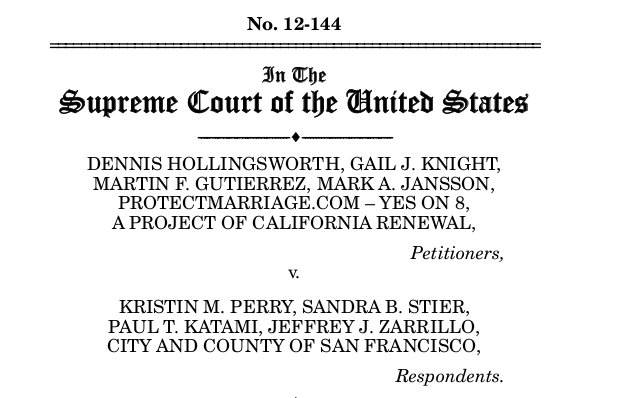San Francisco City Attorney Dennis Herrera and his legal team today submitted written arguments to the US Supreme Court in the landmark same-sex marriage equality case it will consider this spring, with the hopes that their phrases and framing of the issue will be echoed in a civil rights ruling that could go down in history.
He argues that Proposition 8 – the California ballot measure that undid the California Supreme Court ruling legalizing same-sex marriage in a case that grew out of San Francisco’s unilateral decision to start marrying lesbians and gay men in 2004 – was unconstitutionally about “asserting the inferiority of same-sex couples….But relegating gay couples to a lesser status simply to brand them as different and less worthy than opposite-sex couples is not a legitimate purpose.”
Herrera, Deputy City Attorney Therese Stewart, and the rest of the city’s legal team also take up the notion of the “tyranny the majority” (which I explored in an earlier Guardian story on the issue) in their brief, arguing: “Petitioners’ argument derogates the most important role this Court serves in our democracy: to protect the constitutional rights of minorities from encroachment by an unsympathetic majority. The responsibility to protect individual rights does not transfer to the political process when the dispute happens to be ‘controversial.’ Quite the contrary. In this circumstance more than any other, constitutional rights ‘may not be submitted to vote; they depend on the outcome of no elections.’ West Virginia State Bd. of Educ. v. Barnette, 319 U.S. 624, 638 (1943).”
Will the Supreme Court justices borrow any of these words or ideas in their ruling, as they sometimes do in such cases, placing them in history books alongside phrases such as “separate but equal is inherently not equal,” from the 1954 Brown v. Board of Education ruling ending racial segregation, which echoed the 1896 Plessy v. Ferguson ruling that it overturned?
Herrera told us that he couldn’t help but feel that sense of momentousness as he finalized the brief: “You have a sense as to the importance of what you’re working on, and that certainly has an impression on you.”
But he also said that he’s continually had that sense through this “long struggle,” during which he said that he’s remained focused on the LGBT community that he’s fighting to protect. “It’s been frustrating when you see how some folks perpetuate the discrimination that’s gone on too long,” he told us, adding that “to finally see it come to the Supreme Court is momentous.”
And Herrera said that he does hope the Supreme Court issues a broad ruling that finally settles this issue and removes the question of same-sex rights from the political realm and deems them to be an issue of equal protection under the law. “They’ve asked the court to abdicate its responsibility because same-sex marriage is controversial,” Herrera told us, arguing that’s why the Constitution offers equal protections to all citizens, regardless of the passions or societal biases of the moment. “Those constitutional rights are not subject to majority rule.”
You can read city’s full 62-page legal brief here.

